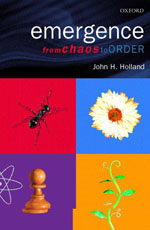John Holland: "Agents: Specializations for Language"
Teleconferenced lecture to be held on Wednesday, April 13, 2005, 18:15.
Room E5, Main Building, ETH Zurich. Event broadcasted from SHARE / Consulate of Switzerland, in Cambridge, Massachusetts.

This presentation treats language as a complex adaptive system (cas), concentrating on language as a social activity involving agents that interact and learn. The model presented is an exploratory model still in the process of implementation, developed in cooperation with Prof. Wm. S.-Y. Wang (Berkeley and Chinese University of Hong Kong). The objective is to demonstrate that there is sufficient information exchanged in the complex adaptive system that (i) newborns can acquire syntax and grammar without receiving specific information about those structures, and (ii) language evolution follows a somewhat similar course. Part of the presentation concerns the development of social networks under the impetus of language.
John H. Holland is Professor of Computer Science and Engineering and Professor of Psychology at the University of Michigan; he is also External Professor and member of the Executive Committee of the Board of Trustees at the Santa Fe Institute. He was made a MacArthur Fellow in 1992 and is a Fellow of the World Economic Forum. He serves on standing panels for the Packard Foundation and the McDonnell Foundation. 48 doctoral students have completed their Ph.D. under his direction. Dr. Holland has been interested for more than 40 years in what are now called complex adaptive systems (cas). He formulated genetic algorithms, classifier systems and the Echo models as tools for studying the dynamics of such systems. His books, HIDDEN ORDER (1995) and EMERGENCE (1998), summarize many of his thoughts about cas.
